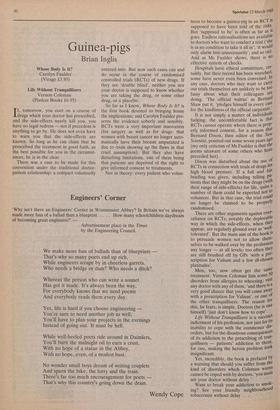Guinea-pigs
Brian Inglis
Whose Body Is It? Carolyn Faulder (Virago £3.95) Life Without Tranquillisers Vernon Coleman (Piatkus Books £6.95)
If, tomorrow, you start on a course of drugs which your doctor has prescribed, and the side-effects nearly kill you, you have no legal redress — not if precedent is anything to go by. He does not even have to warn you that the side-effects are known. So long as he can claim that he prescribed the treatment in good faith, as the best possible for you in the circumst- ances, he is in the clear.
There was a case to be made for this convention under the traditional doctor- patient relationship: a compact voluntarily entered into. But now such cases can and do occur in the course of randomised controlled trials (RCTs) of new drugs. If they are 'double blind', neither you nor your doctor is supposed to know whether you are taking the drug, or some other drug, or a placebo.
So far as I know, Whose Body Is It? is the first book devoted to bringing home the implications; and Carolyn Faulder pre- sents the evidence soberly and sensibly. RCTs were a very important innovation (for surgery as well as for drugs: that women with breast cancer no longer auto- matically have their breasts amputated is due to trials showing up the flaws in that cruel assumption). But they also have disturbing limitations, one of them being that patients are deprived of the right to give informed consent to treatments.
Not in theory: every patient who volun- teers to become a guinea-pig in an RCT is supposed to have been told of the risks. But 'supposed to be' is often as far as it goes. Endless rationalisations are available to doctors who want to conduct a trial ('she is in no condition to take it all in'; 'it would only alarm him unnecessarily'; and so on). And as Ms Faulder shows, there is no effective system of checks.
Hospitals have ethical committees, cer- tainly, but their record has been wretched; some have never even been convened. In any case, doctors who may want to carry out trials themselves are unlikely to be too fussy about what their colleagues ate, doing. 'The official walrus' as Bernard Shaw put it, 'pledges himself in every case for the kindliness of the official carpenter. It is not simply a matter of individuals fudging; the uncomfortable fact is that RCTs cannot operate where there is prop- erly informed consent, for a reason that Bernard Dixon, then editor of the New Scientist, pointed out some seven years ag° (my only criticism of Ms Faulder is that she seems unaware of some others who have preceded her). Dixon was disturbed about the use of RCTs in connection with trials of drugs for high blood pressure. If a full and fair briefing was given, including telling Pa- tients that they might be on the drugs (with their range of side-effects) for life, quite a number of them could be expected not to volunteer. But in that case, the trial could no longer be claimed to be properly randomised.
There are other arguments against over- reliance on RCTs, notably the deplorable way in which the side-effects, when they appear, are regularly glossed over as 'wen- tolerated'. But the main aim of the book is to persuade women not to allow them- selves to be walked over by the profession any longer — at all levels; too often they are still brushed off by GPs 'with a pre- scription for Valium and a few ill-chosen platitudes'. Men, too, now often get the same treatment. Vernon Coleman lists some 50 disorders from allergies to wheezing; visit any doctor with any of them, 'and there is very good chance that you will come away with a prescription for Valium', or one of the other tranquillisers. The reason for this, he fears, is simple. Doctors (he is one himself) 'just don't know how to cope'. Life Without Tranquillisers is a succinct indictment of his profession, not just for its inability to cope with the commoner dis- orders, but for the disastrous consequences of its addiction to the prescribing of tran- quillisers — patients' addiction to them, for one, making the heroin problem look insignificant. Yet, incredibly, the book is prefaced by a warning that should you suffer from the kind of disorders which Coleman warns cannot be coped with by doctors, 'you must see your doctor without delay.' Want to break your addiction to smok- ing? See your friendly neighbourhood tobacconist without delay . . .














































 Previous page
Previous page